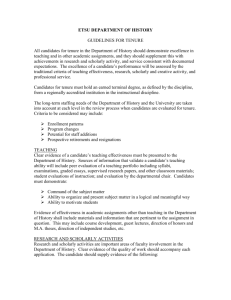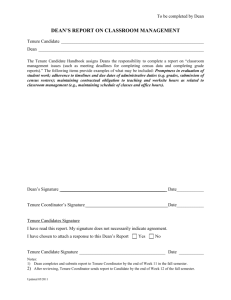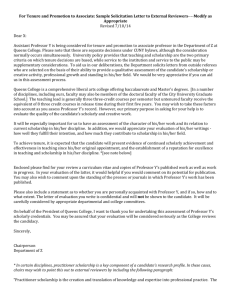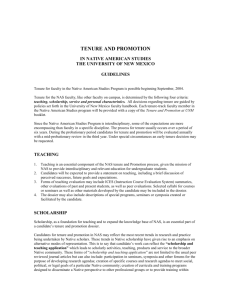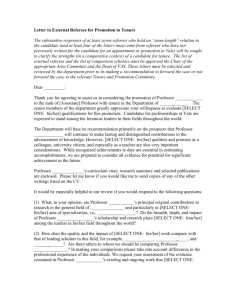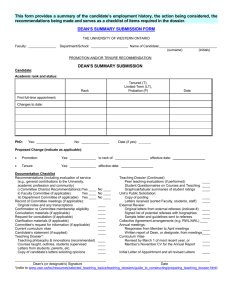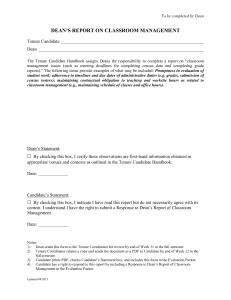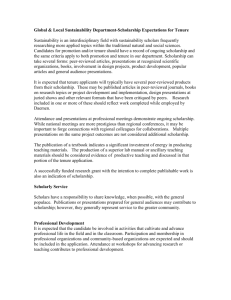CST Promotion and Tenure Guidelines
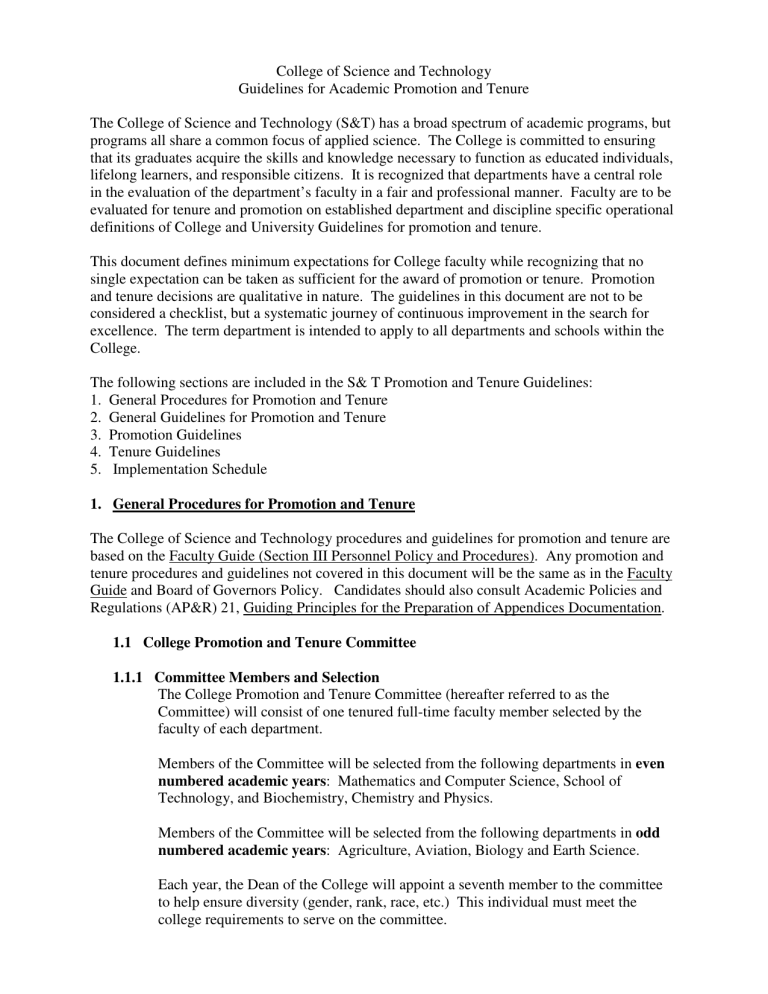
College of Science and Technology
Guidelines for Academic Promotion and Tenure
The College of Science and Technology (S&T) has a broad spectrum of academic programs, but programs all share a common focus of applied science. The College is committed to ensuring that its graduates acquire the skills and knowledge necessary to function as educated individuals, lifelong learners, and responsible citizens. It is recognized that departments have a central role in the evaluation of the department’s faculty in a fair and professional manner. Faculty are to be evaluated for tenure and promotion on established department and discipline specific operational definitions of College and University Guidelines for promotion and tenure.
This document defines minimum expectations for College faculty while recognizing that no single expectation can be taken as sufficient for the award of promotion or tenure. Promotion and tenure decisions are qualitative in nature. The guidelines in this document are not to be considered a checklist, but a systematic journey of continuous improvement in the search for excellence. The term department is intended to apply to all departments and schools within the
College.
The following sections are included in the S& T Promotion and Tenure Guidelines:
1. General Procedures for Promotion and Tenure
2. General Guidelines for Promotion and Tenure
3. Promotion Guidelines
4. Tenure Guidelines
5. Implementation Schedule
1. General Procedures for Promotion and Tenure
The College of Science and Technology procedures and guidelines for promotion and tenure are based on the Faculty Guide (Section III Personnel Policy and Procedures). Any promotion and tenure procedures and guidelines not covered in this document will be the same as in the Faculty
Guide and Board of Governors Policy.
Candidates should also consult Academic Policies and
Regulations (AP&R) 21, Guiding Principles for the Preparation of Appendices Documentation.
1.1
College Promotion and Tenure Committee
1.1.1
Committee Members and Selection
The College Promotion and Tenure Committee (hereafter referred to as the
Committee) will consist of one tenured full-time faculty member selected by the faculty of each department.
Members of the Committee will be selected from the following departments in even numbered academic years : Mathematics and Computer Science, School of
Technology, and Biochemistry, Chemistry and Physics.
Members of the Committee will be selected from the following departments in odd numbered academic years : Agriculture, Aviation, Biology and Earth Science.
Each year, the Dean of the College will appoint a seventh member to the committee to help ensure diversity (gender, rank, race, etc.) This individual must meet the college requirements to serve on the committee.
A candidate for promotion or their family member may not serve in that year.
Faculty serving on either the department or College committee will identify any conflict of interest in accordance with Board of Governors Policy 2.1.050 and exclude themselves from any and all promotion and tenure deliberations and actions related to the conflict of interest.
1.1.2 Committee Terms
Each member will serve a two-year term and no more than two consecutive terms.
The Dean’s appointment will serve for one year.
1.1.3 Committee Meetings
The Committee will establish a meeting schedule for the fall semester to ensure that all dossiers are evaluated and written recommendations are made to the Dean and the candidate according to the time line established in the Faculty Guide.
1.1.4 Committee Responsibilities and Duties
College-level reviewers serve to ensure the consistent application of the College
Guidelines across the departments of the College and to monitor procedural matters.
1.1.4.1
The Committee will consistently apply, in a fair and professional manner,
College Guidelines to all dossiers submitted for the Committee’s review and evaluation.
1.1.4.2 The Committee will select one of its members to serve as a Chair of the
Committee.
1.2
1.1.4.3 Each faculty member’s application is based strictly on that individual’s own merit. Candidates are not ranked at any level for promotion or tenure.
1.1.4.4
Each Committee member will evaluate each dossier submitted for promotion and/or tenure. The full Committee will then meet to discuss each dossier. A quorum of five (5) Committee members is required for all discussions, meetings, and recommendations.
1.1.4.5
The Committee will reach, by simple majority vote of those members in attendance, (at least a quorum) a recommendation on each candidate. This written recommendation is then forwarded to the Dean and the candidate.
1.1.4.6 Each Spring Semester, the Committee will conduct a forum for candidates regarding the promotion and tenure process .
Committee Chair
The Committee shall elect a Chair from its members at the beginning of each academic year. The Chair may serve for more than one academic year.
1.2.1 The Committee Chair will conduct the Committee meetings to review each candidate’s dossier.
1.4
1.2.2 The Committee Chair will ensure, so far as possible, that the Committee will consistently apply College Guidelines to all dossiers submitted for the
Committee’s review and evaluation.
1.2.3 The Committee Chair will forward the Committee’s written recommendation on each candidate to the Dean and to the candidate.
1.2.4
In the spring semester of each year, the Committee Chair, with assistance from the Committee, will conduct a Promotion and Tenure Forum for faculty.
1.2.5 The Committee Chair will convene the Committee as necessary to discuss and act on recommended revisions to the S&T Promotion and Tenure
Guidelines. The Committee Chair will conduct College forums to discuss the recommended revisions. The Committee Chair will then submit proposed revisions to the College faculty for a vote. The results of the vote will be forwarded to the Dean for approval or rejection.
1.3 College Dean
1.3.1 The Dean is responsible, in the promotion and tenure process, to conduct an independent evaluation of each candidate commensurate with projected needs of the Department and College. Additionally, the Dean will assure that the Department has applied its operational definitions fairly.
1.3
.
2 The Dean shall convene the Committee and review the College Guidelines and Departmental Operational Definitions, at the beginning of each academic year, and the Committee’s role in the promotion and tenure process.
1.3.4 The Dean is responsible for assuring that each department develops operational definitions for promotion and tenure consistent with the
College and University Guidelines. The Dean is also responsible for assuring that each department annually reviews, and makes necessary changes to these operational definitions. The Dean shall review and approve the initial Department Operational Definitions and amended changes to these Operational Definitions.
1.3.5 The Dean is responsible for assuring that the College has Promotion and
Tenure Guidelines consistent with the University Guidelines.
1.3.6 The Dean is responsible for informing Candidates regarding the College
Promotion and Tenure Guidelines.
Procedure to Adopt College Guidelines
1.4.1
The faculty will make a recommendation to the Dean to accept or reject the Guidelines by a simple majority vote of the faculty who cast a vote.
All tenured and tenure-track College faculty are eligible to vote.
1.4.2 These Guidelines will be approved by the Dean.
1.5 Procedure to Revise College Guidelines
1.5.1
Revisions to the Guidelines may be recommended by the College tenure and tenure-track faculty to the Committee.
1.5.2
The Committee will discuss proposed revisions and determine by a simple majority vote to accept or reject each revision.
1.5.3
The Committee will then bring the revisions to the full College faculty for discussion. The faculty will make a recommendation to the Dean to accept or reject each proposed revision by a simple majority vote of the faculty who cast a vote. All tenured and tenure-track College faculty are eligible to vote.
1.5.4
Revisions will be effective upon acceptance by the Dean and implemented at the start of the next academic year.
2.
General Guidelines for Promotion and Tenure
The candidate must demonstrate excellence in teaching and achievements in both scholarship and service. Although achievements in scholarship/creative activity and service need not be balanced, collectively the achievements must demonstrate the candidate is worthy of promotion to the next rank.
Departments play a central role in the evaluation of faculty. Department Promotion and Tenure
Committees provide an independent evaluation of each faculty’s dossier. These committees do not serve as faculty advocates in the process.
Departmental level reviewers must assume important responsibilities. These responsibilities include:
1. Evaluation of faculty in a fair and professional manner.
2. Exercise informed professional judgment with respect to the rights of all involved in the process.
3. Validate the authenticity of the material in the appendices.
4. Provide recommendations based upon the evidence in the candidate’s dossier and attachments.
5. Provide a departmental context for a candidate’s record of performance within a discipline for succeeding levels of review.
2.1 Discipline and/or Department Specific Operational Guidelines
It is the responsibility of each department to develop discipline and/or Department specific Operational Definitions for tenure and promotion, consistent with the
Guidelines contained within this document, the Faculty Guide, and Board of
Governors Policy. These Departmental Operational Definitions are to be submitted to the Dean for review and approval. A Department’s Operational Definitions are expected to be at least as stringent as the College Guidelines. Each Department’s
Operational Definitions will (1) provide additional information designed to assist candidates for tenure and promotion to better recognize what is expected of them, and
(2) identify key measures that will assist peer and administrative evaluators in determining whether to recommend a candidate for tenure and/or promotion.
2.2. Teaching
Teaching involves the dissemination of knowledge, the stimulation of critical thinking, and the development of intellectual expression. The College is committed to excellence in teaching. The Faculty Guide provides many examples of evidence to document teaching performance.
2.2.1 Teaching Skills
Requisite skills necessary for excellence in teaching include communication skills; the ability to interest and motivate students to achieve high standards; continued maintenance of professional peer relationships; the ability to generate enthusiasm for learning, mutual respect for all contacts, diversity sensitivity, ongoing professional development, and adaptation with respect to individual student needs and learning styles. The excellent teacher evaluates students fairly and impartially in all aspects of education and instruction. The excellent teacher maintains a professional reputation among students and colleagues for superior teaching skills as documented by student and peer evaluations.
2.2.2 Definition of Teaching Excellence
Teaching excellence is broadly defined as the possession and command of discipline specific knowledge requisite for instruction and learning with a commitment to the learning process and academic rigor.
2.2.3 Documentation of Teaching Excellence
Demonstration of teaching excellence may include many different types of documentation. Examples of evidence which may support excellence in teaching must include student evaluations, peer evaluations, chair evaluations and evidence of self-improvement in the area of instruction. Evidence should be provided relative to how student, peer, and chair evaluations and feedback were used to improve teaching. Each department is expected to develop a peer evaluation process.
2.3. Scholarship/Creative Activities
The College of Science and Technology is committed to the value of scholarship and creative activity. The College recognizes there is a diversity of talents among the College faculty. Because of this diversity, it is essential that departments clearly state the department’s expectations for scholarship and especially for the creative activities of its faculty. Each department shall identify discipline specific examples of scholarship and creative activity that are applicable toward promotion and tenure. The Faculty Guide provides many examples of Scholarship/Creative activities.
2.3.1 Definition of Scholarship/Creative Activity
Scholarship may be defined as the documented distribution and review among peers of work grounded in research and/or creative activity through (1) publication, performance, or display and (2) through presentations at professional conferences, exhibitions or before learned societies. Faculty shall demonstrate a continuous and cumulative body of work with a reputation more national or international in scope as one moves toward full professor.
2.3.2 Criteria for Scholarship/Creative Activity
Scholarship and creative activity can be expressed in many forms, but following
•
• are expected criteria:
• Work is discipline based or supports a faculty member’s discipline and is directly applicable to the academic program goals and objectives related to a faculty member’s assignment/discipline
• Work has pedagogical value or significance within the faculty member’s discipline.
Work generally incorporates methodology from the discipline. scholarly maturity.
Work reflects a level of expertise/creativity that reflects increasing
2.3.3 Definition of Refereed
Refereed, which may be used interchangeably with “peer reviewed” or “juried,” is defined as a structured reviewing system in which at least two reviewers, excluding in-house review, evaluate the submitted works and advise as to acceptance or rejection.
Refereed review is a process used for checking the work performed by one's professional equals or colleagues within a discipline (peers) to ensure it meets specific criteria. Peer review is used in working groups for many professional occupations because it is thought that peers can identify each other's errors.
Generally, the goal of all peer review processes is to verify whether the work satisfies the standards for the discipline, identify any deviations from the standards, and provide suggestions for improvements.
2.3.4
Relationship of Scholarship/Creative Activity to Discipline
Scholarship/creative activity has many components. These components should be directly related to an individual faculty’s discipline and the academic program and department where the faculty member’s appointment resides.
Scholarship/creativity activity beyond this focus is not applicable to promotion and tenure within the College. Scholarship/creative activity shall be interpreted to include, but is not limited to, involvement in the scholarship/creative activity of basic and/or applied research and/or the scholarship/creative activity of teaching.
2.3.4.1 Definition of Basic Research
Basic research is oriented toward new knowledge. It is any activity that is carried out with the deliberate intent of extending knowledge in a particular academic discipline.
2.3.4.2 Definition of Applied Research
Applied research is oriented toward the application of knowledge obtained through basic research in the discipline. It is an activity that is carried out with the deliberate intent of solving a specific problem.
The focus of applied research is the applicability of the research to a well-defined, practical need.
2.3.4.3 Definition of Scholarship of Teaching
The scholarship of teaching and learning is defined as a systematic inquiry. It focuses on the intentions, objectives, processes, and outcomes of formal instruction, mirroring the intellectual endeavors practiced in academic research. This dynamic process may involve reflecting, investigating, collecting data, analyzing, applying, and reporting results. The outcome of this process will be enhanced student learning and more effective instruction.
Scholarship of teaching, sometimes referred to as pedagogical research, is oriented toward all methods of teaching and learning. It is an activity which explores (1) the merits of one educational approach to instruction over another approach, (2) under what conditions students learn best, (3) how educational material may be organized to enhance the learning process, or (4) investigations of the degree to which curricula meet the requirements they have been assigned to meet.
Faculty productivity related to the scholarship of teaching and learning may be used as evidence in the promotion and tenure process.
Examples of scholarship/creative activity include articles in peerreviewed academic or professional journals, presentations at professional meetings, publication in professional meeting proceedings, publication of cases, chapters in text books, and similar outputs. Authorship of test banks, student guides, and similar ancillary materials published in support of a text book are generally considered to be evidence of teaching or service rather than scholarly activity.
Accomplishments related to development of curriculum, pedagogy, and assessment that is not disseminated outside the institution can be used as evidence of teaching.
2.3.4.4 Definition of Creative Activity
Creative activity refers to the result of the production of creative work by faculty. Creative activity involves not only the creation of a tangible product, but the subjection of that creative piece to judgment by the appropriate peer group through the vehicle of a juried performance, show, publication, display, or exhibit.
2.3.5 Documentation of Scholarship/Creative Activities
The Faculty Guide provides many examples of Scholarship/Creative activities.
2.4. Service
Individual departments shall identify discipline specific examples of scholarship and creative activity that are applicable toward promotion and tenure.
The third component of a faculty member’s dossier is professional service. The College of Science and Technology recognizes the significance of service to our students, our colleagues, and our profession. The College further accepts that service entails the application of faculty expertise to the needs or betterment of others without direct financial reimbursement (excluding honoraria).
Candidates are not required to provide service applicable to each of the items enumerated in the Faculty Guide and herein. Rather, candidates must demonstrate, through a sustained level of service, their commitment to participate in their department, college, and university. It is also expected that candidates will provide service to their profession at regional, national, and/or international levels. Individual departments shall also identify discipline specific examples of service and should provide documentation concerning the quality/impact of the candidate’s service activities. Evaluation of service for the purpose of promotion and tenure should be performed by the department and
College Promotion and Tenure committees, the department Chair, and the Dean, and these assessments should be included in the respective letters of the Chair, the Dean, and the committees.
•
•
•
•
•
2.4.1 Documentation of Service
The Faculty Guide provides many examples of service. Evidence used to support performance in Service should not be repeated under Teaching or Scholarly/Creative
Activity. Candidates are encouraged to list those academic, professional or scholarly societies in which their membership is the sole level of involvement under Teaching.
The Faculty Guide Section B – Service item k. provides many examples of activities in which candidates may provide service or opportunity for their colleagues’ professional development. Examples of such activity would include organizing and chairing a session at a meeting, conducting a workshop on discipline-specific or other topics (locally or nationally), preparing media for distribution at such a program, or aiding in planning, preparation, or execution of any of the types of program listed above. (Note: Candidates who were participants in the types of programs listed here without making a substantive contribution are encouraged to list them under Faculty Guide Section B - Teaching item m. or Scholarship/Creative Activity item g.
Additional examples of service activities are:
• Mentoring of junior faculty within the university including serving in producing peer evaluations for promotion and tenure.
Review of professional submissions and media (to include peer review of manuscripts and grant proposals) where discipline-specific knowledge is applied to the evaluation.
Editing of a compiled volume or journal. If the candidate applies his/her professional expertise to the copy-editing or selection of the works to be compiled, such editing or compiling may be considered a scholarly activity.
Development of a departmental or professional newsletter, website, study guide, or other publication of limited circulation that lacked peer-review.
Discipline-related service in a voluntary governmental position or on an advisory board or council outside the university community.
Internal grants and awards, including any outcomes (new equipment for departments, G. A. positions, supplies, etc.).
• Service as an expert witness, translator/interpreter, or consultant, without compensation excepting honoraria.
2.5
The above list is not comprehensive. The candidate may include any other disciplinerelated activities that he/she considers as a service by including the date of service, the beneficiaries, and a description.
Dossier Preparation
The Dossier should be organized according to the outline presented in the Faculty Guide.
Items in which the candidate has no activity should be noted as Not Applicable.
Candidates for simultaneous consideration for promotion and tenure will only prepare area of dossier. one dossier and will include a cover letter for promotion and a cover letter for tenure.
Candidates are encouraged to include a statement describing their discipline and expertise at the beginning of the Scholarship/Creative Activity section of the
Such a statement assists dossier reviewers to place the candidate’s work in the context of the candidate’s discipline.
3. Promotion Guidelines
The College of Science and Technology Guidelines are more stringent in some respects than the minimum requirements stated in the Faculty Guide and Board of Governors Policy. Any promotion procedure or Guideline not covered in the College Guidelines will be the same as in the Faculty Guide. Departments, in turn, may establish requirements more stringent than those of the College.
The following are minimum requirements for promotion from:
3.1 Instructor to Assistant Professor
3.1.1
Credentials as established by the faculty member’s department and Terminal
Degree Requirements as approved by the Provost.
3.1.2
Teaching
Candidates must provide a variety of evidence that documents teaching effectiveness and meets all instructional expectations that may have been established in the faculty member’s department.
3.1.3.
Scholarship/Creative Activities
Candidates must demonstrate a record of scholarly and/or creative achievement that supports the mission and goals of the department and the academic program within the context of his/her discipline. Specific expectations regarding the types of these scholarly and/or creative activities will vary depending on one’s academic discipline and department.
3.1.3.1
Minimum Refereed Publication/Juried Creative Activity Expectations
A faculty member is expected to have, since the last promotion or initial appointment at Central, whichever last occurred, published a minimum of two refereed publications or juried creative activities. These refereed publications/juried creative activities are to be (1) discipline based or support the faculty member’s discipline (including scholarship of teaching) and (2) directly applicable to the academic program goals and objectives related to the faculty member’s assignment.
3.1.3.2
Substitutions for Refereed Publications/Juried Creative Activities
The following can be substituted for only one of the two required refereed publications/juried creative activities: a. Two (2) refereed presentation including papers, speeches, lectures, and poster sessions presented at institutions, conventions, workshops, conferences, exhibitions and symposia may be substituted for 1 refereed publication/juried creative activity. b. Manuscript of refereed paper presented at a state, regional or national conference or exhibition and published in conference proceedings. c. Externally funded grant through the Office of Sponsored Programs or d. e. award through the UCM University Foundation in support of the program and department. Include any outcomes (new equipment for departments,
G.A. positions, supplies, etc.).
Doctoral dissertation completed since last promotion or initial appointment.
Applied creative endeavor that is carried out with the deliberate intent of solving a problem. Each applied creative endeavor must be peer reviewed by at least two faculty of other universities which are approved by the department chairperson.
3.1.4. Service
Candidates must document service activities appropriate to the mission of the faculty member's department and college.
3.2. Assistant Professor to Associate Professor
3.2.1.
Credentials as established by the faculty member’s department and Terminal
Degree Requirements as approved by the Provost.
3.2.2. Teaching
Candidates must provide a variety of evidence that documents teaching effectiveness and meets all instructional expectations that may have been established in the faculty member’s department.
3.2.3.
Scholarship/Creative Activities
Candidates must demonstrate a record of continuing scholarly or creative achievement that supports the mission and goals of the department and the academic program within the context of his/her discipline. Specific expectations regarding the type of these scholarly and/or creative activities will vary depending on one’s academic discipline and department
3.2.3.1
Minimum Refereed Publication/Juried Creative Activity Expectations
A faculty member is expected to have published a minimum of three refereed, discipline-related publications or juried creative activities. These refereed publications/juried creative activities are to be (1) discipline based or support the faculty member’s discipline (including scholarship of teaching) and (2) directly applicable to the academic program goals and objectives related to the faculty member’s assignment.
3.2.3.2 Substitutions for Refereed Publication/Juried Creative Activity
The following can be substituted for two of three required refereed publications/juried creative activities: a. Two (2) refereed presentations including papers, speeches, and lectures presented at institutions, conventions, workshops, conferences, exhibitions and symposia may be substituted for 1 refereed publication/juried creative activity. b. c.
A funded, external, peer-reviewed, competitive grant can be substituted for 1 refereed publication/juried creative activity. Include any outcomes
(new equipment for departments, G.A. positions, supplies, etc.).
Doctoral dissertation completed since last promotion or initial d. appointment can be substituted for 1 refereed publication/juried creative activity.
Departments will be responsible for determining whether a candidate may have both substitutions from the same category (refereed presentations, grants, dissertation).
Applied creative endeavor that is carried out with the deliberate intent of solving a problem. Each applied creative endeavor must be peer reviewed by at least two faculty of other universities which are approved by the department chairperson.
3.2.3.3 Other Categories of Scholarly/Creative Activity
1.
The Faculty Guide provides many examples of Scholarship/Creative
Activities.
3.2.4
Statement of Scholarship/Creative Activity
Candidates are encouraged to include a statement describing discipline and area of expertise at the beginning of the Scholarship/Creative Activity section of the dossier.
Such a statement assists the dossier reviewers to place the candidate’s work in the context of the candidate’s discipline.
3.2.5. Service
Candidates must document service to the department, College, University, and to their profession.
3.3 Associate Professor to Full Professor
3.3.1.
Credentials as established by the faculty member’s department and Terminal
Degree Requirements as approved by the Provost.
3.3.2. Teaching
Candidates must demonstrate the maturity of their teaching by showing that their instructional contributions are significant and multifaceted and have developed to a high level which has been continuous since the last promotion or initial appointment, whichever occurred last. Candidates must provide a variety of significant evidence that documents teaching effectiveness, and meets all instructional expectations that may have been established in the faculty member’s department.
3.3.3. Scholarship/Creative Activities
Candidates must demonstrate a record of continuous scholarly or creative achievement that supports the mission and goals of the department and the academic program within the context of his/her discipline. Candidates must demonstrate that they have produced a coherent body of substantial and critically reviewed scholarly and/or creative work.
3.3.3.1
Minimum Refereed Publication/Juried Creative Activity Expectations
A faculty member is expected to have, since the last promotion or initial appointment whichever occurred last, published a minimum of four refereed, discipline-related publications or juried creative activities. These refereed publications/juried creative activities are to be (1) discipline based or support the faculty member’s discipline (including scholarship of teaching) and (2) directly applicable to the academic program goals and objectives related to the faculty member’s assignment.
3.3.3.2 Substitutions for Refereed Publication/ Juried Creative Activity
The following may be substituted for two (2) of the four required refereed publications/juried creative activities: a. Two (2) refereed presentations including papers, speeches, and lectures b. presented at institutions, conventions, workshops, conferences, exhibitions and symposia may be substituted for 1 refereed publication/juried creative activity.
A funded, external, peer-reviewed, competitive grant can be substituted c. d. for 1 refereed publication/juried creative activity. Include any outcomes
(new equipment for departments, G.A. positions, supplies, etc.).
Doctoral dissertation completed since last promotion or initial appointment can be substituted for 1 refereed publication/juried creative activity.
Applied creative endeavor that is carried out with the deliberate intent of solving a problem. Each applied creative endeavor must be peer reviewed by at least two faculty of other universities which are approved by the department chairperson.
Departments will be responsible for determining whether a candidate may have both substitutions from the same category (refereed presentations, grants, dissertation).
3.3.3.3 Other Categories of Scholarly/Creative Activity
The Faculty Guide provides many examples of Scholarship/Creative Activities.
3.3.4 Service
Candidates must document service to the department, college, university, and to their profession. Candidates will demonstrate leadership roles at many levels: on the campus and at state, regional or national/international levels.
4. Tenure
The College of Science and Technology standards and guidelines for the award of tenure are based on the Faculty Guide and Board of Governors Policy. Tenure is not automatically granted upon appointment or promotion to a particular rank, and tenure is not automatically granted based on a specified number of years of service to the university. The successful candidate for tenure must possess the appropriate academic credentials and must meet (1) the teaching, scholarship/creative activity, and service expectations for the candidate’s current rank, and (2) the collegiality expectations of the department and college.
4.1 Teaching, Scholarship/Creative Activity, and Service Expectations
Candidates for tenure must meet the following teaching, scholarship/creative activity, and service requirements based on the candidate’s rank in the year the application for tenure is submitted.
4.1.1 Assistant Professor – Successful candidates for tenure must meet the minimum requirements for promotion to Assistant Professor as specified in
Section 3.1 of these Guidelines.
4.1.2 Associate Professor – Successful candidates for tenure must meet the minimum requirements for promotion to Associate Professor as specified in
Section 3.2 of these Guidelines.
4.1.3 Professor – Successful candidates for tenure must meet the minimum requirements for promotion to Professor as specified in Section 3.3 of these
Guidelines.
4.2
Collegiality Expectations
“Considering the long-term commitment involved, the awarding of tenure should be based on an analysis of present and anticipated needs of the department and a careful and complete review of all aspects of the individual, keeping in mind the value of having persons with a variety of backgrounds, training, experience, viewpoints, and interests.”
Faculty Guide, Section III, B, 3, d. Those tasked with appraising a tenure candidate’s collegiality should understand that the award of tenure will likely involve a long-term appointment to the college and department. Collegiality is a professional (not personal) criterion that focuses on the candidate’s performance as a faculty member in the college and department. Collegiality is not likeability or sociability. Collegiality is not conformity to the views of tenured faculty.
In appraising a candidate’s collegiality, department members should keep in mind that the successful candidate for tenure will assume what may be an appointment of 30 years or more in the department. Collegiality should not be confused with sociability or likeability. Collegiality is a professional, not personal, criterion relating to the performance of a faculty member's duties within a department. The requirement that a
candidate demonstrate collegiality does not license tenured faculty to expect conformity to their views. Concerns relevant to collegiality include the following: Are the candidate's professional abilities and relationships with colleagues compatible with the departmental mission and with its long-term goals? Has the candidate exhibited an ability and willingness to engage in shared academic and administrative tasks that a departmental group must often perform and to participate with some measure of reason and knowledge in discussions germane to departmental policies and programs? Does the candidate maintain high standards of professional integrity?
Collegiality can best be evaluated at the departmental level. Concerns respecting collegiality should be shared with the candidate as soon as they arise. Faculty members should recognize that their judgment of a candidate's collegiality will carry weight with the Promotion and Tenure Committee."
Issues relevant to an appraisal of a tenure candidate’s collegiality are:
•
Are the candidate’s professional abilities and relationships with colleagues compatible with the missions and long-term goals of the college and department?
• Has the candidate demonstrated an ability and willingness to engage in shared academic and administrative tasks that colleges and departments must often
• perform?
Has the candidate exhibited an ability and willingness to participate with some measure of reason and knowledge in discussions germane to college and departmental policies and programs?
• Has the candidate established and maintained high standards of professional integrity?
“Utmost care will be exercised by all individuals and bodies reviewing applications for tenure to exclude possible prejudice concerning such matters as age, race, color, religion, sex, national origin, sexual orientation, marital status, Vietnam Era veterans, and persons with handicaps and disabilities.” Faculty Guide, Section III, B, 3, d.
5. Implementation Schedule
5.1
Effective Date
Guidelines (initial or revised) will be in effect upon acceptance by the Dean.
5.2 Implementation Date
The initial Guidelines will be implemented Fall 2008. Revised Guidelines are implemented at the beginning of the Fall Semester or the next academic year.
5.3 Individual Variance
In recognition of the possibility that individual faculty members may need time to change their professional development to meet these Guidelines, Chairs may propose to the
Dean, on a case to case basis, variances in the implementation of certain sections of the
Guidelines in terms of implementation date or content. Any such variances must be requested six months prior to the implementation date of these Guidelines or subsequent revisions
.
The Dean will exercise professional judgment in evaluating these requests and may approve or disapprove such variances on an individual basis.
The Dean, as academic leader in the college, will make the final decision on variance requests.
